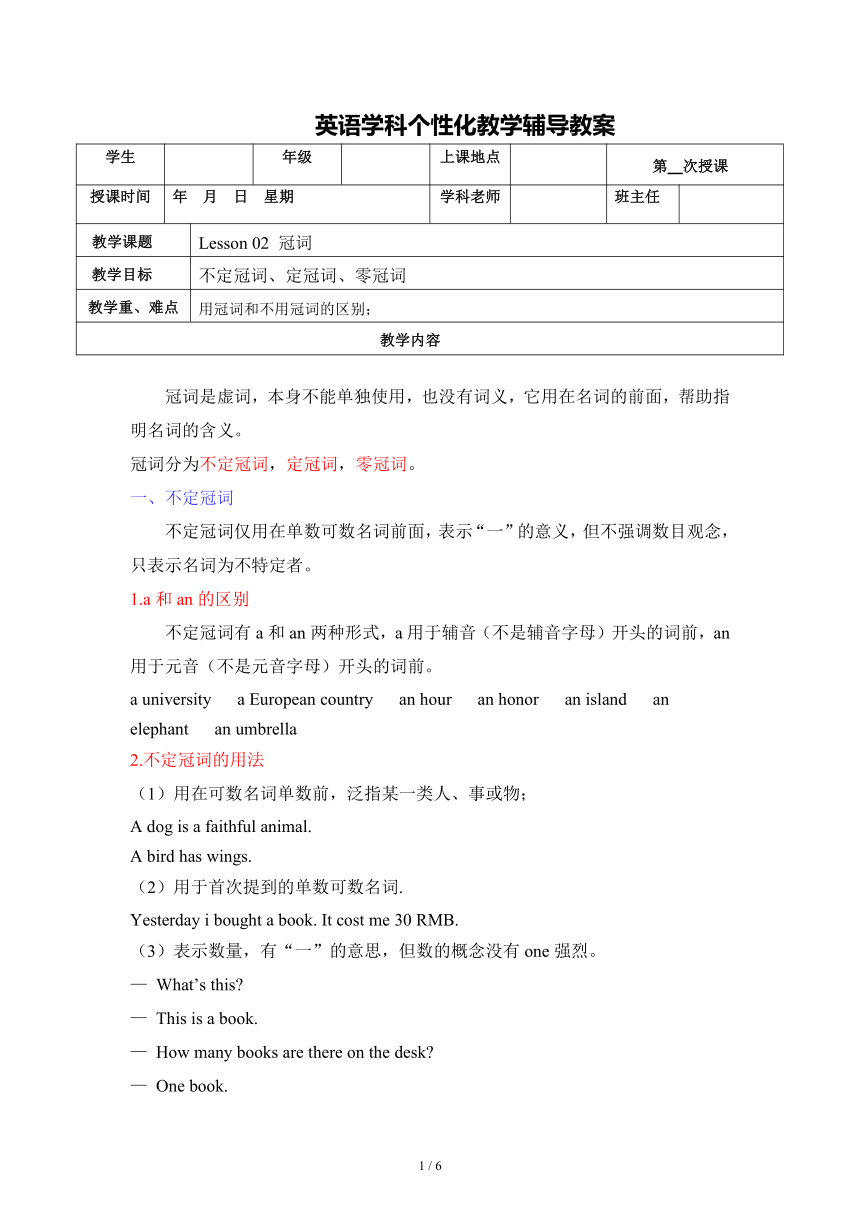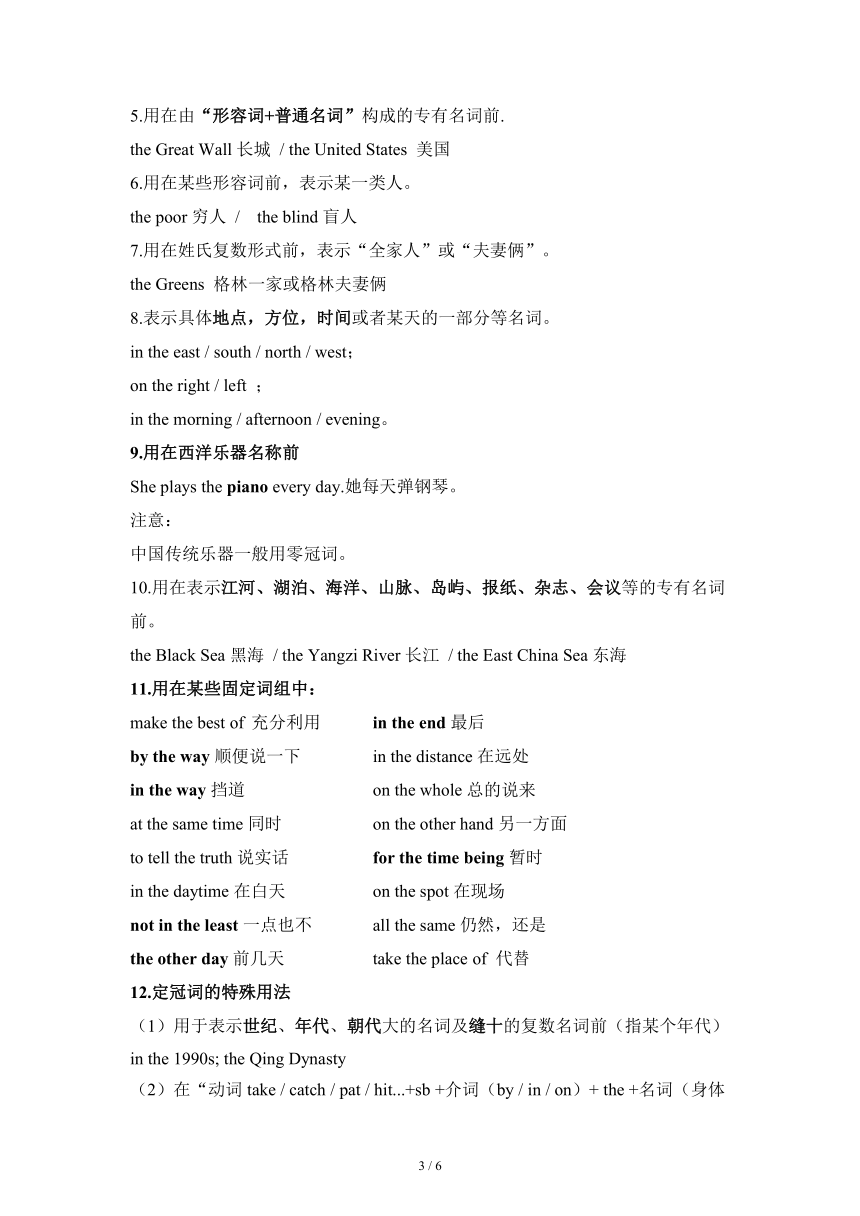2022年中考英语语法专题-第02讲 冠词
文档属性
| 名称 | 2022年中考英语语法专题-第02讲 冠词 |

|
|
| 格式 | docx | ||
| 文件大小 | 33.4KB | ||
| 资源类型 | 教案 | ||
| 版本资源 | 通用版 | ||
| 科目 | 英语 | ||
| 更新时间 | 2022-01-19 00:00:00 | ||
图片预览



文档简介
英语学科个性化教学辅导教案
学生 年级 上课地点 第 次授课
授课时间 年 月 日 星期 学科老师 班主任
教学课题 Lesson 02 冠词
教学目标 不定冠词、定冠词、零冠词
教学重、难点 用冠词和不用冠词的区别;
教学内容
冠词是虚词,本身不能单独使用,也没有词义,它用在名词的前面,帮助指明名词的含义。
冠词分为不定冠词,定冠词,零冠词。
一、不定冠词
不定冠词仅用在单数可数名词前面,表示“一”的意义,但不强调数目观念,只表示名词为不特定者。
1.a和an的区别
不定冠词有a和an两种形式,a用于辅音(不是辅音字母)开头的词前,an用于元音(不是元音字母)开头的词前。
a university a European country an hour an honor an island an elephant an umbrella
2.不定冠词的用法
(1)用在可数名词单数前,泛指某一类人、事或物;
A dog is a faithful animal.
A bird has wings.
(2)用于首次提到的单数可数名词.
Yesterday i bought a book. It cost me 30 RMB.
(3)表示数量,有“一”的意思,但数的概念没有one强烈。
— What’s this
— This is a book.
— How many books are there on the desk
— One book.
(4)表示“每一”,相当于every / per。
One apple a day, keep the doctors away.
I go to school five days a week.
(5)用来表示不确定的某一个,相当于a certain, some
A Mr Wang came to see you this morning.
(6)用在物质名词前,表示“一阵,一份,一场,一种, 一杯”等。
a heavy rain 一阵雨 / an ice-cream 一份冰淇淋
(7)a有时也可以用在部分形式上是最高级的前面,但不表示最高级
Shenzhen is a most beautiful city. =
Shenzhen is a very beautiful city.
3.不定冠词的习惯搭配
as a result 因此 as a rule 通常
as a whole 总体上 as a matter of fact 事实上
at a loss 不知所措 in a hurry 匆忙
in a word 总之 in a sense 在某种意义上
in a way 在某种程度上 in a short while 不久
keep an eye on 照看, 留意 pay a visit to 拜访
put an end to 结束 once in a while 偶尔
once upon a time 从前 all of a sudden 突然
二、定冠词的用法
1.特指某(些)人或某(些)物,这是定冠词的基本用法。
What do you think of the book
2.指上文已经提到的人或事物。
I have a car. The car is red. 我有一辆小汽车,它是红色的。
3.指世界上独一无二的事物,但是如果这些词前有修饰词可以用不定冠词。
Which is bigger, the sun or the earth
a bright moon
4.用在序数词,形容词最高级前及形容词only, very, same 前面。
The first lesson is the easiest one in this book.第一课是这本书最简单的一课。
That’s the very thing I’m looking for.
5.用在由“形容词+普通名词”构成的专有名词前.
the Great Wall长城 / the United States 美国
6.用在某些形容词前,表示某一类人。
the poor穷人 / the blind盲人
7.用在姓氏复数形式前,表示“全家人”或“夫妻俩”。
the Greens 格林一家或格林夫妻俩
8.表示具体地点,方位,时间或者某天的一部分等名词。
in the east / south / north / west;
on the right / left ;
in the morning / afternoon / evening。
9.用在西洋乐器名称前
She plays the piano every day.她每天弹钢琴。
注意:
中国传统乐器一般用零冠词。
10.用在表示江河、湖泊、海洋、山脉、岛屿、报纸、杂志、会议等的专有名词前。
the Black Sea黑海 / the Yangzi River长江 / the East China Sea东海
11.用在某些固定词组中:
make the best of 充分利用 in the end最后
by the way顺便说一下 in the distance在远处
in the way挡道 on the whole总的说来
at the same time同时 on the other hand另一方面
to tell the truth说实话 for the time being暂时
in the daytime在白天 on the spot在现场
not in the least一点也不 all the same仍然,还是
the other day前几天 take the place of 代替
12.定冠词的特殊用法
(1)用于表示世纪、年代、朝代大的名词及缝十的复数名词前(指某个年代)
in the 1990s; the Qing Dynasty
(2)在“动词take / catch / pat / hit...+sb +介词(by / in / on)+ the +名词(身体某一部位)”结构中,the不能用形容词性物主代词代替。
He took her by the hand. / He hit me on the head.
(3)用在表示度量单位名词前,如by the hour / day / week/ month /year / dozen / kilo / ton但是size / weight / time 这类词跟by连用时不用冠词。
I hired the car by the hour. / Apples are sold by weight while coal is sold by the ton.
三、零冠词的用法
1.不含普通名词的专有名词前(包括人名、地名、 国名、车站、街名、公园)不用冠词。
China / Beijing
2.可数名词前已有作定语的物主代词(my,your,his,her等)、指示代词(this / these,that / those)、不定代词(some,any等)及所有格限制时。如:
my book(正);my the book(误)
3.复数名词表示一类人或事物时。
They are teachers.他们是老师。
Tigers like meat.老虎喜欢吃肉
4.在季节,星期,月份,节假日前。
on Sunday在周日,in March在三月,in spring在春天,on Women’s Day在妇女节
(如果月份,季节等被一个限定性定语修饰时,则要加定冠词:He joined the Army in the spring of 1982. 他在1982年春季参军.)
5.表示独一无二的职位,称呼,头衔前用零冠词。
Tom汤姆,Mum妈妈 President 总统
6.在学科名称,球类运动,棋类游戏等名词前,不用冠词。
basketball football baseball ( 棒球 ) volleyball 排球 tennis 网球
handball 手球 hockey 曲棍球 golf 高尔夫球 table tennis snooker台球
注意:
当football,basketball指具体的某个球时,其前可以用冠词。
I can see a football.我可以看到一只足球。
Where’s the football?那只足球在哪儿?(指足球,并非“球类运动”)
7.表示一日三顿饭的名词前不用冠词,但是前面有修饰词前要用冠词
have breakfast
have a wonderful breakfast
8.零冠词的习惯搭配
at present目前 take part in参加
in peace平静 by chance / accident碰巧
on purpose故意 on second thoughts再一想
ahead of time提前 in advance提前
by law根据法律 by mistake由于差错
under repair处于维修中 lose heart灰心
day and night整天整夜 from morning till night从早到晚
out of control失控 out of work 失业
in danger处于危险中 at risk有危险
at daybreak / dawn / noon / night / midnight 在佛晓,黎明,正午,黄昏,夜晚,午夜
四、用与不用冠词的差异
in hospital住院 in the hospital在医院里
go to sea出海 go to the sea去海边
on earth究竟 on the earth在地球上,在世上
in front of在……(外部的) 前面 in the front of在……( 内部的 ) 前面
take place发生 take the place ( of ) 代替
at table进餐 at the table在桌子旁
by sea乘船 by the sea在海边
in future从今以后,将来 in the future未来
go to school (church...)上学 ( 做礼拜…) go to the school(church...)到学校(教堂…)去
two of us我们当中的两人 the two of us我们两人 (共计两人)
out of question毫无疑问 out of the question不可能的,办不到的
next year明年 the next year 第二年
a teacher and writer一位教师兼作家 a teacher and a writer一位教师和一位作家
in the bed 表示在床里面,即在被窝里 in bed 躺在床上,卧病在床
on the/one’s bed 在某张/某人的床上
学生 年级 上课地点 第 次授课
授课时间 年 月 日 星期 学科老师 班主任
教学课题 Lesson 02 冠词
教学目标 不定冠词、定冠词、零冠词
教学重、难点 用冠词和不用冠词的区别;
教学内容
冠词是虚词,本身不能单独使用,也没有词义,它用在名词的前面,帮助指明名词的含义。
冠词分为不定冠词,定冠词,零冠词。
一、不定冠词
不定冠词仅用在单数可数名词前面,表示“一”的意义,但不强调数目观念,只表示名词为不特定者。
1.a和an的区别
不定冠词有a和an两种形式,a用于辅音(不是辅音字母)开头的词前,an用于元音(不是元音字母)开头的词前。
a university a European country an hour an honor an island an elephant an umbrella
2.不定冠词的用法
(1)用在可数名词单数前,泛指某一类人、事或物;
A dog is a faithful animal.
A bird has wings.
(2)用于首次提到的单数可数名词.
Yesterday i bought a book. It cost me 30 RMB.
(3)表示数量,有“一”的意思,但数的概念没有one强烈。
— What’s this
— This is a book.
— How many books are there on the desk
— One book.
(4)表示“每一”,相当于every / per。
One apple a day, keep the doctors away.
I go to school five days a week.
(5)用来表示不确定的某一个,相当于a certain, some
A Mr Wang came to see you this morning.
(6)用在物质名词前,表示“一阵,一份,一场,一种, 一杯”等。
a heavy rain 一阵雨 / an ice-cream 一份冰淇淋
(7)a有时也可以用在部分形式上是最高级的前面,但不表示最高级
Shenzhen is a most beautiful city. =
Shenzhen is a very beautiful city.
3.不定冠词的习惯搭配
as a result 因此 as a rule 通常
as a whole 总体上 as a matter of fact 事实上
at a loss 不知所措 in a hurry 匆忙
in a word 总之 in a sense 在某种意义上
in a way 在某种程度上 in a short while 不久
keep an eye on 照看, 留意 pay a visit to 拜访
put an end to 结束 once in a while 偶尔
once upon a time 从前 all of a sudden 突然
二、定冠词的用法
1.特指某(些)人或某(些)物,这是定冠词的基本用法。
What do you think of the book
2.指上文已经提到的人或事物。
I have a car. The car is red. 我有一辆小汽车,它是红色的。
3.指世界上独一无二的事物,但是如果这些词前有修饰词可以用不定冠词。
Which is bigger, the sun or the earth
a bright moon
4.用在序数词,形容词最高级前及形容词only, very, same 前面。
The first lesson is the easiest one in this book.第一课是这本书最简单的一课。
That’s the very thing I’m looking for.
5.用在由“形容词+普通名词”构成的专有名词前.
the Great Wall长城 / the United States 美国
6.用在某些形容词前,表示某一类人。
the poor穷人 / the blind盲人
7.用在姓氏复数形式前,表示“全家人”或“夫妻俩”。
the Greens 格林一家或格林夫妻俩
8.表示具体地点,方位,时间或者某天的一部分等名词。
in the east / south / north / west;
on the right / left ;
in the morning / afternoon / evening。
9.用在西洋乐器名称前
She plays the piano every day.她每天弹钢琴。
注意:
中国传统乐器一般用零冠词。
10.用在表示江河、湖泊、海洋、山脉、岛屿、报纸、杂志、会议等的专有名词前。
the Black Sea黑海 / the Yangzi River长江 / the East China Sea东海
11.用在某些固定词组中:
make the best of 充分利用 in the end最后
by the way顺便说一下 in the distance在远处
in the way挡道 on the whole总的说来
at the same time同时 on the other hand另一方面
to tell the truth说实话 for the time being暂时
in the daytime在白天 on the spot在现场
not in the least一点也不 all the same仍然,还是
the other day前几天 take the place of 代替
12.定冠词的特殊用法
(1)用于表示世纪、年代、朝代大的名词及缝十的复数名词前(指某个年代)
in the 1990s; the Qing Dynasty
(2)在“动词take / catch / pat / hit...+sb +介词(by / in / on)+ the +名词(身体某一部位)”结构中,the不能用形容词性物主代词代替。
He took her by the hand. / He hit me on the head.
(3)用在表示度量单位名词前,如by the hour / day / week/ month /year / dozen / kilo / ton但是size / weight / time 这类词跟by连用时不用冠词。
I hired the car by the hour. / Apples are sold by weight while coal is sold by the ton.
三、零冠词的用法
1.不含普通名词的专有名词前(包括人名、地名、 国名、车站、街名、公园)不用冠词。
China / Beijing
2.可数名词前已有作定语的物主代词(my,your,his,her等)、指示代词(this / these,that / those)、不定代词(some,any等)及所有格限制时。如:
my book(正);my the book(误)
3.复数名词表示一类人或事物时。
They are teachers.他们是老师。
Tigers like meat.老虎喜欢吃肉
4.在季节,星期,月份,节假日前。
on Sunday在周日,in March在三月,in spring在春天,on Women’s Day在妇女节
(如果月份,季节等被一个限定性定语修饰时,则要加定冠词:He joined the Army in the spring of 1982. 他在1982年春季参军.)
5.表示独一无二的职位,称呼,头衔前用零冠词。
Tom汤姆,Mum妈妈 President 总统
6.在学科名称,球类运动,棋类游戏等名词前,不用冠词。
basketball football baseball ( 棒球 ) volleyball 排球 tennis 网球
handball 手球 hockey 曲棍球 golf 高尔夫球 table tennis snooker台球
注意:
当football,basketball指具体的某个球时,其前可以用冠词。
I can see a football.我可以看到一只足球。
Where’s the football?那只足球在哪儿?(指足球,并非“球类运动”)
7.表示一日三顿饭的名词前不用冠词,但是前面有修饰词前要用冠词
have breakfast
have a wonderful breakfast
8.零冠词的习惯搭配
at present目前 take part in参加
in peace平静 by chance / accident碰巧
on purpose故意 on second thoughts再一想
ahead of time提前 in advance提前
by law根据法律 by mistake由于差错
under repair处于维修中 lose heart灰心
day and night整天整夜 from morning till night从早到晚
out of control失控 out of work 失业
in danger处于危险中 at risk有危险
at daybreak / dawn / noon / night / midnight 在佛晓,黎明,正午,黄昏,夜晚,午夜
四、用与不用冠词的差异
in hospital住院 in the hospital在医院里
go to sea出海 go to the sea去海边
on earth究竟 on the earth在地球上,在世上
in front of在……(外部的) 前面 in the front of在……( 内部的 ) 前面
take place发生 take the place ( of ) 代替
at table进餐 at the table在桌子旁
by sea乘船 by the sea在海边
in future从今以后,将来 in the future未来
go to school (church...)上学 ( 做礼拜…) go to the school(church...)到学校(教堂…)去
two of us我们当中的两人 the two of us我们两人 (共计两人)
out of question毫无疑问 out of the question不可能的,办不到的
next year明年 the next year 第二年
a teacher and writer一位教师兼作家 a teacher and a writer一位教师和一位作家
in the bed 表示在床里面,即在被窝里 in bed 躺在床上,卧病在床
on the/one’s bed 在某张/某人的床上
同课章节目录
- 词法
- 名词
- 动词和动词短语
- 动词语态
- 动词时态
- 助动词和情态动词
- 非谓语动词
- 冠词
- 代词
- 数词和量词
- 形容词副词及其比较等级
- 介词和介词短语
- 连词和感叹词
- 构词法
- 相似、相近词比较
- 句法
- 陈述句
- 一般疑问句和否定疑问句
- 特殊疑问句及选择疑问句
- 反意疑问句
- 存在句(There be句型)
- 宾语从句
- 定语从句
- 状语从句
- 主谓一致问题
- 简单句
- 并列句
- 复合句
- 主谓一致
- 主、表语从句
- 名词性从句
- 直接引语和间接引语
- 虚拟语气
- 感叹句
- 强调句
- 倒装句
- 祈使句
- 句子的成分
- 句子的分类
- 题型专区
- 单项选择部分
- 易错题
- 完形填空
- 阅读理解
- 词汇练习
- 听说训练
- 句型转换
- 补全对话
- 短文改错
- 翻译
- 书面表达
- 任务型阅读
- 语法填空
- 其他资料
